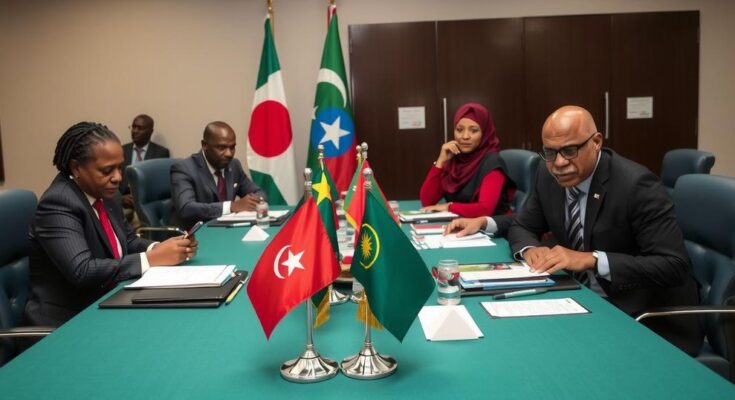A Somali delegation visited Addis Ababa to reinforce the Ankara Agreement, an initiative aimed at fostering cooperation between Ethiopia and Somalia. Signed in December 2017, the agreement allows Ethiopia access to maritime routes under Somalia’s sovereignty, promoting regional peace and partnership. Both nations are focused on overcoming past conflicts to enhance diplomatic relations and mutual prosperity.
On December 14, 2017, a delegation led by Somalia’s Minister of Foreign Affairs and International Cooperation, Ali Omar, visited Addis Ababa as part of efforts to bolster the agreements established in the Ankara Agreement. The Somali Ministry of Foreign Affairs emphasized that this visit aims to reinforce the commitments of the agreement while expressing a firm dedication to enhancing bilateral relations with Ethiopia, as previously discussed in Ankara under the leadership of Turkish President Recep Tayyip Erdoğan.
The Ankara Agreement, which was signed on December 2, 2017, between Ethiopian Prime Minister Abiy Ahmed and Somali President Hassan Sheikh Mohamud, is recognized as a significant diplomatic initiative intended to promote peace and regional cooperation in the Horn of Africa. The agreement grants Ethiopia access to a sustainable maritime route under Somalia’s sovereignty, a crucial development for Ethiopia, a landlocked nation seeking vital trade routes to foster economic growth.
During the delegation’s visit, the focus was also placed on improving ties not only between Ethiopia and Somalia but also within the broader context of the region. Somalia’s Ministry reaffirmed its commitment to respecting the sovereignty, independence, and territorial integrity of both nations, indicating a shift towards prioritizing constructive engagement over historical grievances. This partnership seeks to enhance regional cooperation and mutual prosperity, underscoring the ongoing commitment to leave behind past conflicts.
The key tenets of the Ankara Agreement include an emphasis on mutual respect and sovereignty, acknowledgment of past sacrifices by Ethiopian forces, and a structured approach to technical negotiations facilitated by Turkey. Additionally, provisions for peaceful dispute resolution highlight the commitment to addressing any arising issues collaboratively, fostering a supportive diplomatic environment.
The implications of the Ankara Agreement extend beyond bilateral relations; they signal an increasing international interest in promoting stability in the Horn of Africa, as evidenced by endorsements from global leaders such as French President Emmanuel Macron. Together, Ethiopia and Somalia’s collective efforts are poised to foster economic cooperation and regional stability, potentially setting a precedent for conflict resolution models in the area.
The Ankara Agreement, signed by Ethiopian and Somali leaders in December 2017, is a pivotal initiative in enhancing the diplomatic and economic landscape of the Horn of Africa. Recognizing Ethiopia’s lack of direct maritime access, the agreement stipulates that Somalia will provide Ethiopia with safe and sustainable sea passage while respecting each country’s sovereignty. The historical tensions between Ethiopia and Somalia have hindered regional unity, making this agreement a foundational effort to promote peace and collaboration. As both countries emphasize constructive dialogue, they strive to leave behind the conflicts of the past and venture into a more cooperative future that benefits both nations.
In conclusion, the visit of Somalia’s delegation to Addis Ababa marks a significant step in reinforcing the Ankara Agreement, which aims to enhance cooperation and stability in the Horn of Africa. By respecting each other’s sovereignty and focusing on constructive partnerships, both Ethiopia and Somalia are committed to fostering regional prosperity. The successful implementation of this agreement not only strengthens bilateral ties but also serves as a beacon of hope for conflict resolution in the region.
Original Source: addisinsight.net




